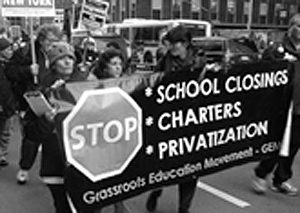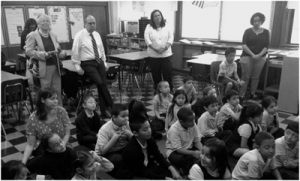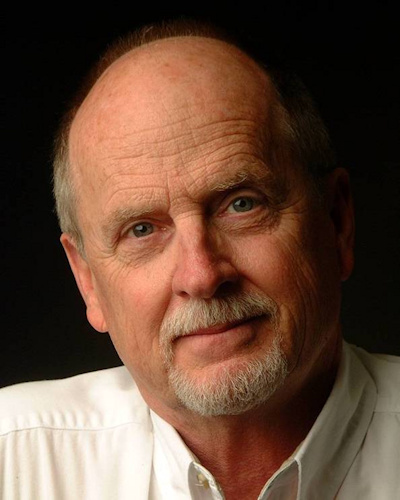<< LAST Contents NEXT >>
RESIST THE EXTREMIST’S WAR ON THE PUBLIC SCHOOL

Jacob Asbell
April 12,2018
Tallahassee Democrat
There is a quote from Nelson Mandela stuck to the back wall of my classroom. It reads, “Education is the most powerful weapon which you can use to change the world.”
With that in mind, we should all wonder what type of change Secretary of Education Betsy DeVos is after by disarming public schools through policies that divert funds to charter and private institutions.
During a recent “60 Minutes interview” with Lesley Stahl, DeVos claimed, “We have invested billions and billions and billions of dollars from the federal level, and we have seen zero results” — an old but still popular talking point used by politicians to justify budget cuts.
Later in the interview, when Stahl challenged her to visit underperforming public schools to learn about their problems, DeVos responded, “Maybe I should.”
We must wonder whether DeVos is choosing to remain ignorant to the potential consequences of her actions, or if she understands the damage she is doing and is refusing to acknowledge it. Stephen Colbert may have had the best analogy for her policies, likening DeVos to a doctor who tries to incentivize sick patients to get well by withholding their medication.
All over the nation, teachers are striking, speaking out, and unfortunately, leaving the classroom. We are exhausted by hostile rhetoric from our policymakers decrying education as a problem with no solution.
Now with DeVos leading the charge, state officials across the nation are taking steps that will do Irreparable damage to — and in some places, almost entirely dismantle — public school systems, in the name of saving money. Which is exactly what conservative lawmakers may be after, a way out of funding equal education.
Eventually this will help weaken teacher unions and dramatically reduce pension costs to the states. But this also may be an indication of something much more sinister than just budget cuts. These policies, whether intended or not, are racially biased, because they will redistribute money earmarked for schools with the highest concentrations of minorities.
Since the Elementary and Secondary Education Act of 1965, schools serving large populations of low-income families have benefited from increased funding from Title I money. Those institutions serve the vast majority of our minority and English Language Learning students. In many states, like Florida, most of these schools are deemed underperforming based mainly on high-stakes and invalid testing policies like the Florida Standards Assessment.
Now students at these schools have the option of moving to an alternative school with their state funding in tow. This may ultimately decrease the population sizes and budgets of our already poorest schools to such dismal levels that the state could begin to justify shutting them down, like in Gadsden County.
Considering minority and low-income communities will be most affected by such an exodus, DeVos’ punitive policies could further exacerbate an achievement gap already prevalent in our society. Given her admitted ignorance of public school systems, shouldn’t we be asking what DeVos really wants?
Jacob Asbell is the head soccer coach and AVID teacher at Amos P. Godby High School.
https://www.tallahassee.com/story/opinion/2018/04/12/opinion-betsy-devos-has-declared-war-public-education/506847002/
Americans Have Given Up on Public Schools. That’s a Mistake.
The current debate over public education underestimates its value—and forgets its purpose.

ERIKA CHRISTAKIS
OCTOBER 2017 ISSUE THE ATLANTIC
At a moment when our media preferences, political affiliations, and cultural tastes seem wider apart than ever, abandoning this amalgamating function is a bona fide threat to our future. And yet we seem to be headed in just that direction. The story of American public education has generally been one of continuing progress, as girls, children of color, and children with disabilities (among others) have redeemed their constitutional right to push through the schoolhouse gate. But in the past few decades, we have allowed schools to grow more segregated, racially and socioeconomically. (Charter schools, far from a solution to this problem, are even more racially segregated than traditional public schools.)
Simultaneously, we have neglected instruction on democracy. Until the 1960s, U.S. high schools commonly offered three classes to prepare students for their roles as citizens: Government, Civics (which concerned the rights and responsibilities of citizens), and Problems of Democracy (which included discussions of policy issues and current events). Today, schools are more likely to offer a single course. Civics education has fallen out of favor partly as a result of changing political sentiment. Some liberals have come to see instruction in American values—such as freedom of speech and religion, and the idea of a “melting pot”—as reactionary. Some conservatives, meanwhile, have complained of a progressive bias in civics education.
Especially since the passage of No Child Left Behind, the class time devoted to social studies has declined steeply. Most state assessments don’t cover civics material, and in too many cases, if it isn’t tested, it isn’t taught. At the elementary-school level, less than 40 percent of fourth-grade teachers say they regularly emphasize topics related to civics education.
So what happens when we neglect the public purpose of our publicly funded schools? The discussion of vouchers and charter schools, in its focus on individual rights, has failed to take into account American society at large. The costs of abandoning an institution designed to bind, not divide, our citizenry are high.
Already, some experts have noted a conspicuous link between the decline of civics education and young adults’ dismal voting rates. Civics knowledge is in an alarming state: Three-quarters of Americans can’t identify the three branches of government. Public-opinion polls, meanwhile, show a new tolerance for authoritarianism, and rising levels of antidemocratic and illiberal thinking. These views are found all over the ideological map, from President Trump, who recently urged the nation’s police officers to rough up criminal suspects, to, ironically, the protesters who tried to block DeVos from entering a Washington, D.C., public school in February.
We ignore public schools’ civic and integrative functions at our peril. To revive them will require good faith across the political spectrum. Those who are suspicious of public displays of national unity may need to rethink their aversion. When we neglect schools’ nation-binding role, it grows hard to explain why we need public schools at all. Liberals must also work to better understand the appeal of school choice, especially for families in poor areas where teacher quality and attrition are serious problems. Conservatives and libertarians, for their part, need to muster more generosity toward the institutions that have educated our workforce and fueled our success for centuries.
The political theorist Benjamin Barber warned in 2004 that “America as a commercial society of individual consumers may survive the destruction of public schooling. America as a democratic republic cannot.” In this era of growing fragmentation, we urgently need a renewed commitment to the idea that public education is a worthy investment, one that pays dividends not only to individual families but to our society as a whole.
We want to hear what you think about this article. Submit a letter to the editor or write to letters@theatlantic.com.
ERIKA CHRISTAKIS is the author of The Importance of Being Little: What Young Children Really Need From Grownups.
https://www.theatlantic.com/magazine/archive/2017/10/the-war-on-public-schools/537903/
<< LAST Contents NEXT >>

